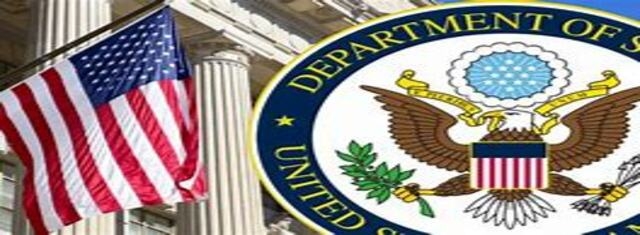News
The COVID-19 Global Action Plan Senior Officials Meeting
US Dept of State Media Report

(Source: File photo)
USPA NEWS -
The world has made significant progress in reducing the threat posed by COVID-19. However, more than two years into the pandemic, global suffering continues and challenges remain.
Yesterday, the U.S. Department of State convened a Senior Officials Meeting of the COVID-19 Pandemic Prioritized Global Action Plan for Enhanced Engagement (“GAP”) members to coordinate the development and implementation of concrete solutions aimed at solving critical gaps in the COVID-19 global response and strengthening global health security architecture to better prepare for the future.
The Senior Officials Meeting focused on work under the GAP’s six lines of effort:
The Senior Officials Meeting focused on work under the GAP’s six lines of effort:
Get Shots in Arms: Officials discussed how to increase political will and accelerate progress throughout 2022 to rapidly and equitably deliver COVID-19 vaccines with a focus on reaching high-priority populations. Since the launch of the GAP, partners have ramped up vaccine deliveries, improved cold chain capacity to store and ship more doses to more places, and conducted in-country campaigns to increase demand for vaccines and reach vulnerable groups. For example, Colombia has stepped up its efforts to vaccinate Venezuelan refugees; India has enhanced its vaccine production; Japan has significantly expanded cold chain storage worldwide; and Australia and New Zealand are focused on vaccinating citizens in the Pacific Islands. In addition to sharing more than 550 million COVID-19 vaccine doses with over 115 countries and economies, the United States, in partnership with COVAX, has begun donating pediatric Pfizer vaccines for 5-to-12 year-olds. Throughout the meeting, officials discussed how best to build upon this progress.
Bolster Supply Chain Resilience: Participants outlined private sector roundtables and other efforts to bolster and coordinate health supply chains to date and assessed gaps and priorities going forward. They reviewed past, present, and anticipated supply chain challenges and responses, including how to ensure sustainable production capacity to match forecasted demand. GAP partners discussed their efforts to build forecasting and resilience mechanisms into global supply chains to better address shortages and disruptions. For example, the European Union and the United States have been consulting with businesses and regional supply chain actors across the world on how to adapt medical supply chains to improve health systems, with a special focus on Africa.
Address Information Gaps: Officials considered prioritizing national COVID-19 vaccination, including campaigns to reach priority populations, and the need to address disinformation. Under Canada’s leadership, GAP partners are coordinating across governments to combat misinformation and disinformation. This includes the sharing of best practices and initiatives like the United States Global VAX effort, which uses evidence-based interventions to increase vaccine demand and vaccine confidence.
Support Health Workers: Participants discussed the need for collective efforts to support frontline health workers and developed plans to coordinate responses. With leadership from Spain, India, and the Republic of Korea, GAP members are focused on health worker access to vaccines, and accurate information about vaccines so that they can stay healthy and keep doing their heroic work. Expanded access to mental health support was also discussed.
Facilitate Acute Non-Vaccine Interventions: Attendees examined the research around new therapeutics and broke new ground on a wide range of test and treat topics, including the need to implement test-to-treat strategies and create an enabling environment for equitable and sustained access to novel, innovative treatments.
Facilitate Acute Non-Vaccine Interventions: Attendees examined the research around new therapeutics and broke new ground on a wide range of test and treat topics, including the need to implement test-to-treat strategies and create an enabling environment for equitable and sustained access to novel, innovative treatments.
Strengthen Global Health Security Architecture: Participants reviewed current efforts to enhance future preparedness for health threats and examined the best approaches to the future of ACT-A, COVAX, and potential new elements of the global health security architecture, like the concept of a Global Health Threats Council. Norway and South Africa outlined how since the launch of the GAP in February, they have led coordination around the Access to COVID-19 Tools-Accelerator’s (ACT-A) work to develop and equitably distribute tests, treatments, vaccines. Additionally, Germany, the United Kingdom, and Japan have mobilized donors and Indonesia has spearheaded the creation of the Financial Intermediary Fund (FIF) for pandemic preparedness as part of its G20 Presidency role.
Participants joining the United States in the COVID-19 Global Action Plan Senior Officials Meeting included Argentina, Australia, Bangladesh, Belize, Botswana, Canada, Colombia, Costa Rica, France, Germany, India, Indonesia, Israel, Italy, Jamaica, Japan, Kenya, Maldives, Morocco, Namibia, New Zealand, Nigeria, Norway, Oman, Republic of Korea, Saudi Arabia, South Africa, Spain, Switzerland, Thailand, The African Union and the Africa CDC, The European Union, United Arab Emirates, United Kingdom, and the World Health Organization.
Thank you for reading my article. These are merely my thoughts and insights based on the facts. I use only verified sources. No fake news here. I write about a variety of subjects, mainly things I want to research and know more about. You can check out my website – Small Village Life at smallvillagelife.com, where I share useful articles and news.
Wendy writes for the United States Press Agency and is a former columnist with the Fulton County Expositor, Wauseon, Ohio.
Source: US Department of State Media Note June 16, 2022
Wendy writes for the United States Press Agency and is a former columnist with the Fulton County Expositor, Wauseon, Ohio.
Source: US Department of State Media Note June 16, 2022
more information: https://smallvillagelife.com/pg-2
Liability for this article lies with the author, who also holds the copyright. Editorial content from USPA may be quoted on other websites as long as the quote comprises no more than 5% of the entire text, is marked as such and the source is named (via hyperlink).





